Arab legacy lingers as Pakistan’s Gwadar grows from tiny fishing town into port city
April 29, 2019
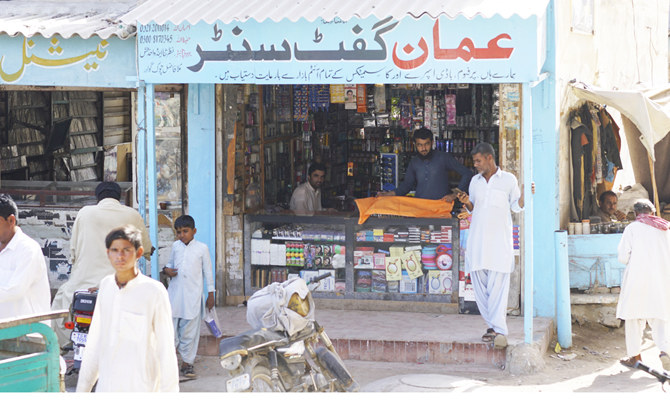
1 / 3
Many shopkeepers in Gwadar’s Shahi and other markets told Arab News on Tuesday, April 23, 2019 that they have displayed photos of the ruler of the Sultanate of Oman in their shops as a show of respect. (AN Photo by Hassam Lashkari)
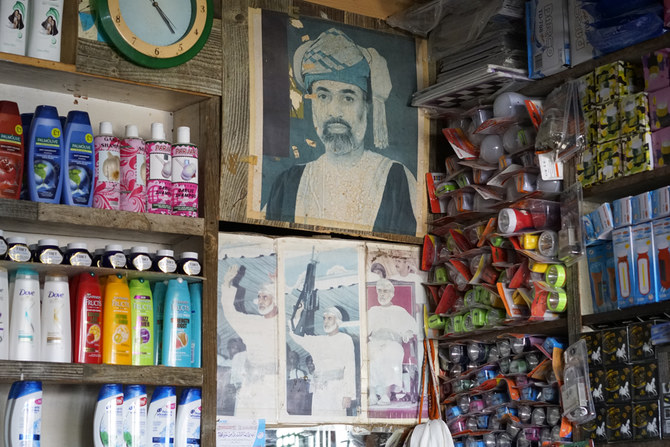
2 / 3
Several shops in Pakistan's coastal town of Gwadar are named Oman, which locals told Arab News on Tuesday, April 23, 2019 is a manifestation of the strong bond between the people of Gwadar and their old Arab rulers. (AN Photo by Hassam Lashkari)
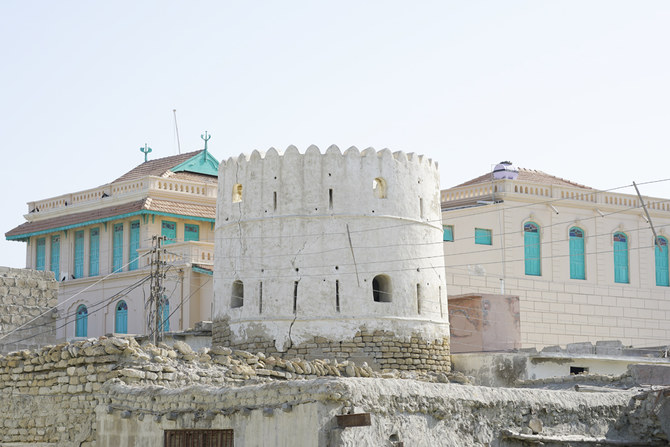
3 / 3
In this photograph taken on April 23, 2019, an Omani fort used for keeping inmates can be seen near Shahi Bazaar in Gwadar city (AN Photo by Hassam Lashkari)
Naimat Khan
It was Eid in the Omani city of Gwadar, and the blast was its official declaration.
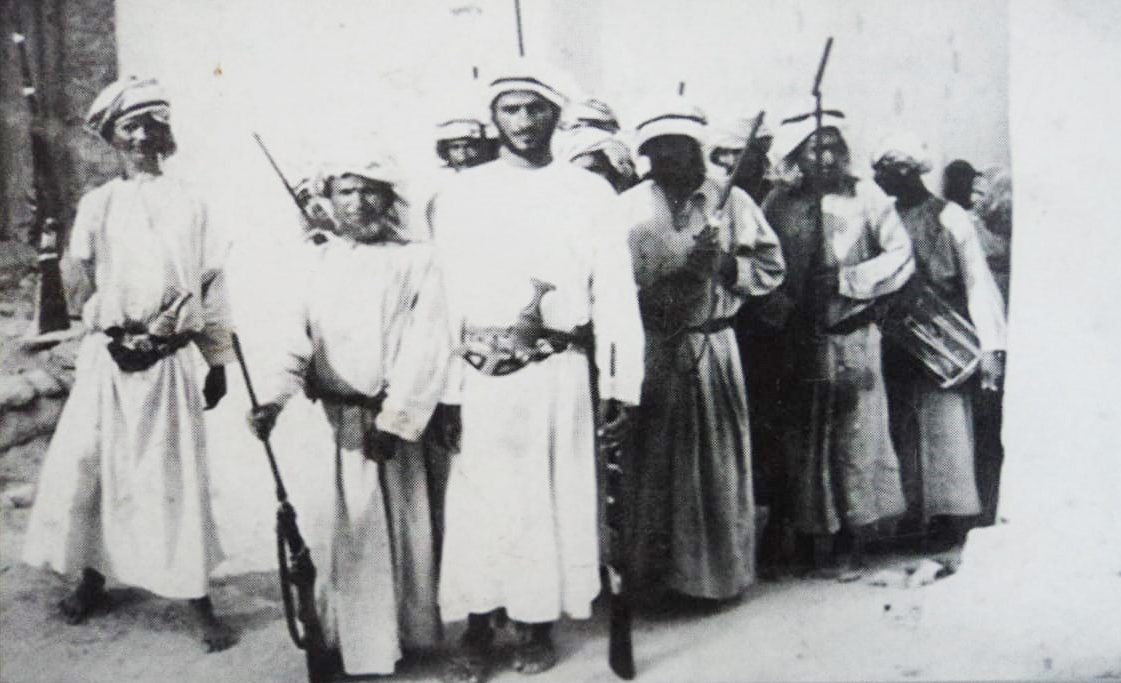
Arab soldiers of Oman seen in a photo handout by Gwadar resident Nasir Raheem.
“A few years later, when Gwadar became part of Pakistan, the ritual was no longer practiced. Yet, we continue do many things that are specific to the legacy of Arab rule in Gwadar,” recalled Akbar, now 78, while sipping his tea at the historic Kareemuk Hotel in Shahi Bazaar – or the royal market.
The hotel itself is the remnant of the bygone era when Oman ruled the territory. “It used to be a bakery owned by an Arab, Omar Mascuti, who gifted it to a local, Abdul Salam, who turned it into a tea shop.”
The culturally diverse city of Gwadar also has the ancestral neighborhood of Sadruddin Hashwani – chairman of the Hashoo Group, a conglomerate of hotels and resorts – where a large number of Ismaili Khojas live.
“This fishing village of a few thousand people, which grew into a city of nearly ninety thousand people, has a Hindu temple and an Ismaili jamaat khana,” Noor Mohsin, a resident of Gwadar, said, adding: “It’s a testament to the fact that Gwadar during and after the Arab rule was a diverse town. It still is today.”
Gwadar is situated on a natural hammerhead-shaped headland that forms two seamless, but naturally curved, semi-circular bays on both side – the east bay called Demi Zirr, and the west bay called Paddi Zirr. The city is situated on a tapered and sandy 12-kilometer-long strip that links the Pakistani coast to rocky outcroppings in the Arabian Sea known as the Gwadar Peninsula, or Koh-e-Batil.
In 1783, Taimur Sultan, the grandfather of Oman’s incumbent ruler, Qaboos bin Said al Said, ran away to Kalat Khanate after getting defeated where the ruler, Mir Noori Naseer Khan Baloch, granted him suzerainty over Gwadar. Sultan continued to rule over the territory even after reclaiming Muscat and appointed an administrator to Gwadar.
Three forts were built here during the Omani rule, while telegraph lines were also extended into the town at a later stage. On 8 September 1958, Pakistan purchased Gwadar from Oman for Rs5.5 billion (or US$ 3.89 billion in 2019).
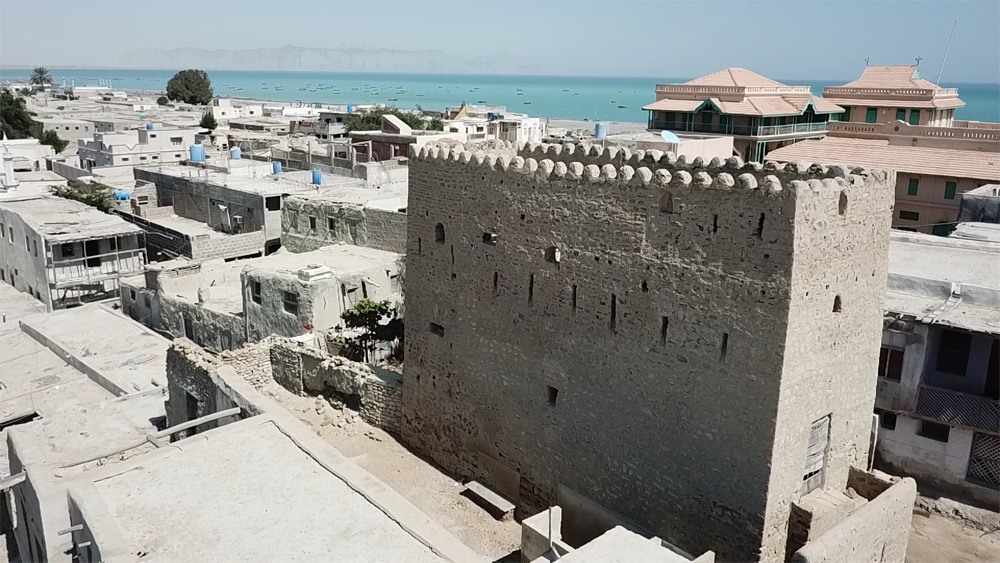
This photo taken on Tuesday April 23, 2019 shows one of three Omani forts in Gwadar, which was part of the Sultanate of Oman until September 1958. (AN Photo by Hassam Lashkari)
With Pakistan’s ownership, the Arab era came to an end here. However, Gwadar’s journey, from a small fishing village to a port city, has not taken away the golden memories of that period from its residents.
“The cannons you see outside the old municipal office are not fired to announce the advent of Eid. Still we break our fast much like Arabs,” Akbar said.
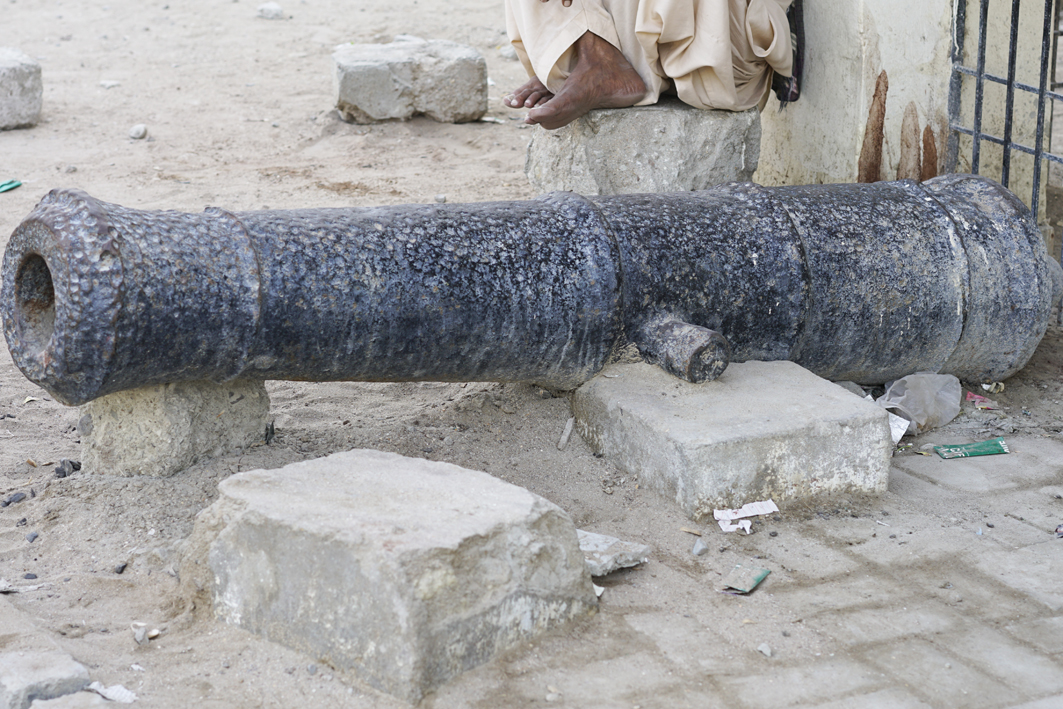
This cannon displayed outside the old municipal office of Gwadar is one the two cannons which would fire explosives to announce the beginning of the religious festival of Eid before Pakistan purchased Gwadar from Oman in 1958, locals told Arab News on Tuesday, April 23, 2019 (AN Photo by Hassam Lashkari)
Unlike the rest of Balochistan, the people of Gwadar consume a substantial quantity of dates and lassi [a yogurt-based drink] during Ramadan and have their dinner after tarawih prayers. Sukoun, an Arabian dish, is also made and shared by residents of different neighborhoods among themselves. “Dates are softened in water and wheat flour is mixed with them. Women here in olden days started making it at noon and send it to neighbors hours before iftar,” told Nasir Raheem, a social activist, whose father Raheem Bux Sohrabi was one of nearly half a dozen influential personalities who campaigned for Gwadar’s accession with Pakistan.
Sakeena Bibi, 80, said that women had soaked up quite a few traditions from Arabs and still practiced them. “The women in Gwadar like to use oud scent,” she said. “Oud is put on flaming coals and the smoke is then spread in the wardrobes that result in excellent and long lasting fragrance.”
“When someone in Oman or other Gulf countries inquire about our gift choices, we ask them to send us oud,” she told Arab News.
Sakeena is aged but still remembers her Arab friends, Shadi and Kana’an. “The women in Gwadar and Makran chant the same way as Arab women while we are happy. This is what we have adopted from them.”
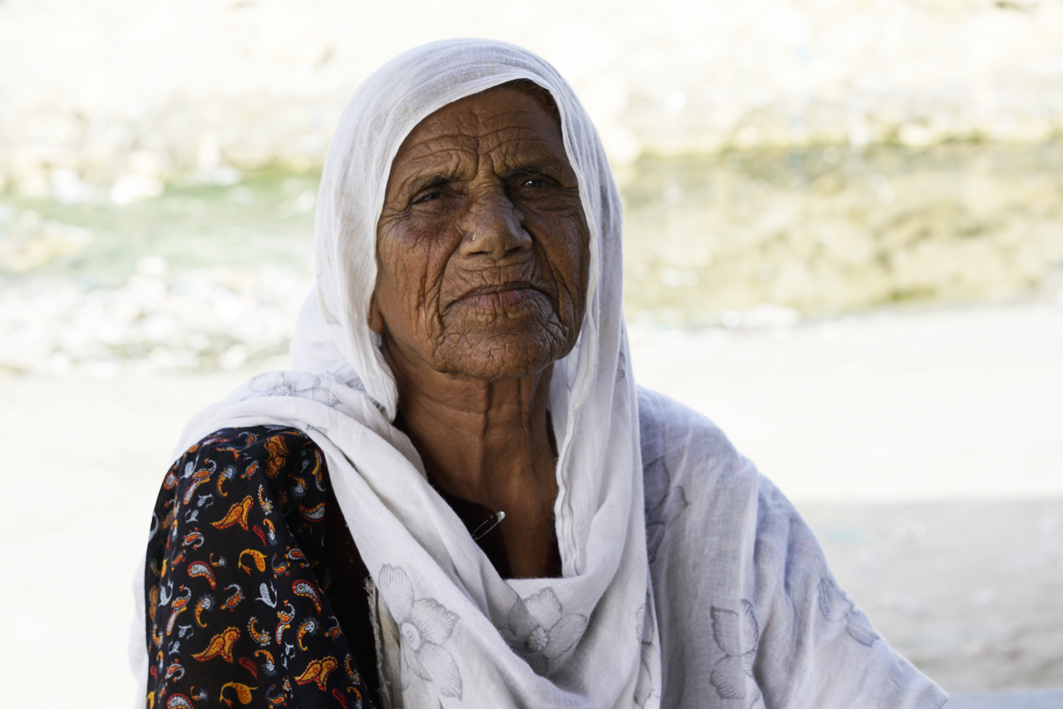
On April 23, 2019, Sakeena Bibi, 80, recalled "the golden days" of Gwadar before Pakistan purchased the town from the rulers of Oman in 1958 (AN Photo by Hassam Lashkari)
But it’s not just the food or fragrance: The people of Gwadar have also copied Arab dances. “Leva is an African and Arab dance. A man in center beats a drum and people dance around it,” Raheem said.
“The strong bond,” he continued, “is not confined to few customs. Many people in Gwadar are dual nationals and say that they belong to both Pakistan and Oman. A large number of people from Makran serves in Oman’s army. A good number is part of the Bahraini police. A large number works in Oman, Qatar, UAE and Bahrain and send remittances to families in Pakistan. Those are permanently settled there provide financial support to their relatives here.”
“My brother works in Oman. My sister is an Omani national. It’s the story of every second household and it connects us to the Arab world,” he told Arab News.
Akbar says there are several similar wedding rituals among Arabs and Baloch. “There had been intermarriages as well. Some people here still wear kandura on special occasions like weddings, Eid and Jumma prayers,” Akbar said.
Dad Karim, a fisherman who like many old residents have still kept his parents’ old passport of 1900, said there were people who could tolerate criticism of Pakistan rulers, “but there are others who get annoyed when someone says something against the rulers of Oman.”
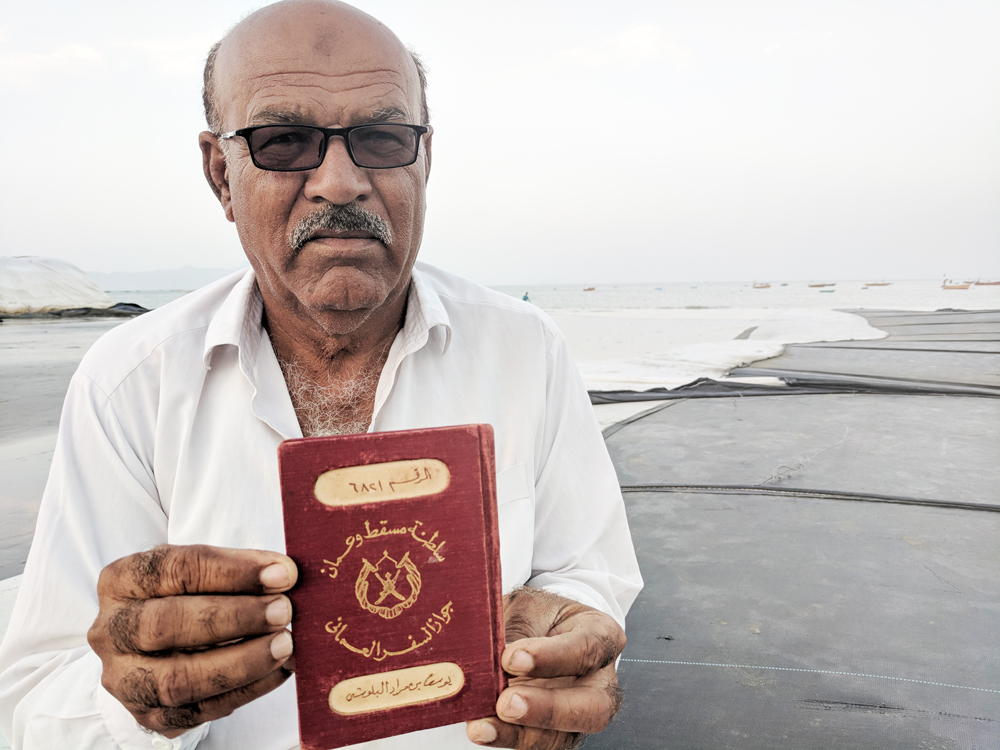
Dad Kareem, a fisherman who has kept the old Omani passport of his father, told Arab News on Tuesday, April 23, 2019 that the people of Gwadar have a special love for Arabs (AN Photo by Hassam Lashkari)
The date palms of the coastal Makran district were also contributed by Arabs, including some preachers from Saudi Arabia, who brought date seeds with them that benefitted us for centuries, Karim said.
The Shahi Bazaar and three forts also reminds people of Gwadar about the Omani rule. One of them has been turned into a museum after the ministry of heritage and culture of the Sultanate of Oman restored it on the directives of Sultan Qaboos bin Said during his state visit to Pakistan in 2001. It was officially inaugurated by General (r) Pervez Musharraf on March 20, 2007.
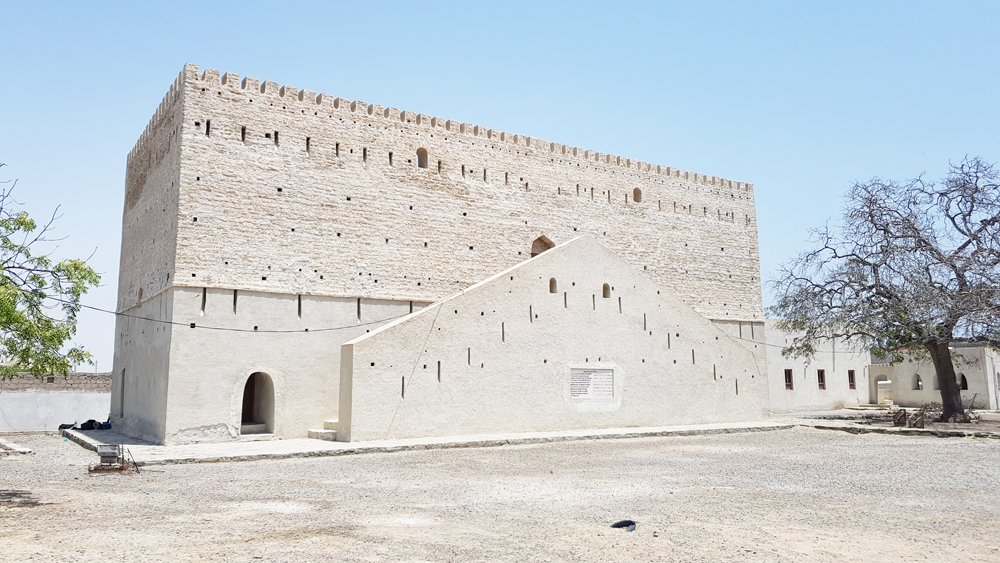
This photo taken on Tuesday April 23, 2019 shows a Omani fort in Thana Ward in Gwadar, which has now been converted into museum. (AN Photo by Hassam Lashkari)
“Arabs are great people. When someone from a foreign country rules another population, the locals begin to despise them. Ours is a special case. There is love and only love,” Karim said.
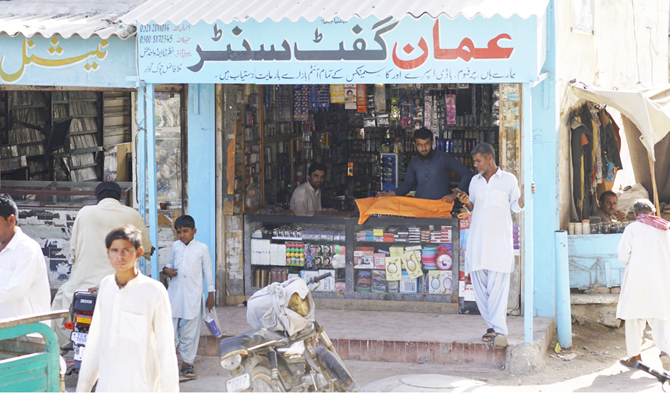
 www.arabnews.com
www.arabnews.com
April 29, 2019

1 / 3
Many shopkeepers in Gwadar’s Shahi and other markets told Arab News on Tuesday, April 23, 2019 that they have displayed photos of the ruler of the Sultanate of Oman in their shops as a show of respect. (AN Photo by Hassam Lashkari)

2 / 3
Several shops in Pakistan's coastal town of Gwadar are named Oman, which locals told Arab News on Tuesday, April 23, 2019 is a manifestation of the strong bond between the people of Gwadar and their old Arab rulers. (AN Photo by Hassam Lashkari)

3 / 3
In this photograph taken on April 23, 2019, an Omani fort used for keeping inmates can be seen near Shahi Bazaar in Gwadar city (AN Photo by Hassam Lashkari)
Naimat Khan
- Pakistan bought Gwadar from Oman for Rs5.5 billion in 1958
- Thousands of Gwadar locals have dual Pakistani and Omani nationality, continue to live and work between the two countries
It was Eid in the Omani city of Gwadar, and the blast was its official declaration.

Arab soldiers of Oman seen in a photo handout by Gwadar resident Nasir Raheem.
“A few years later, when Gwadar became part of Pakistan, the ritual was no longer practiced. Yet, we continue do many things that are specific to the legacy of Arab rule in Gwadar,” recalled Akbar, now 78, while sipping his tea at the historic Kareemuk Hotel in Shahi Bazaar – or the royal market.
The hotel itself is the remnant of the bygone era when Oman ruled the territory. “It used to be a bakery owned by an Arab, Omar Mascuti, who gifted it to a local, Abdul Salam, who turned it into a tea shop.”
The culturally diverse city of Gwadar also has the ancestral neighborhood of Sadruddin Hashwani – chairman of the Hashoo Group, a conglomerate of hotels and resorts – where a large number of Ismaili Khojas live.
“This fishing village of a few thousand people, which grew into a city of nearly ninety thousand people, has a Hindu temple and an Ismaili jamaat khana,” Noor Mohsin, a resident of Gwadar, said, adding: “It’s a testament to the fact that Gwadar during and after the Arab rule was a diverse town. It still is today.”
Gwadar is situated on a natural hammerhead-shaped headland that forms two seamless, but naturally curved, semi-circular bays on both side – the east bay called Demi Zirr, and the west bay called Paddi Zirr. The city is situated on a tapered and sandy 12-kilometer-long strip that links the Pakistani coast to rocky outcroppings in the Arabian Sea known as the Gwadar Peninsula, or Koh-e-Batil.
In 1783, Taimur Sultan, the grandfather of Oman’s incumbent ruler, Qaboos bin Said al Said, ran away to Kalat Khanate after getting defeated where the ruler, Mir Noori Naseer Khan Baloch, granted him suzerainty over Gwadar. Sultan continued to rule over the territory even after reclaiming Muscat and appointed an administrator to Gwadar.
Three forts were built here during the Omani rule, while telegraph lines were also extended into the town at a later stage. On 8 September 1958, Pakistan purchased Gwadar from Oman for Rs5.5 billion (or US$ 3.89 billion in 2019).

This photo taken on Tuesday April 23, 2019 shows one of three Omani forts in Gwadar, which was part of the Sultanate of Oman until September 1958. (AN Photo by Hassam Lashkari)
With Pakistan’s ownership, the Arab era came to an end here. However, Gwadar’s journey, from a small fishing village to a port city, has not taken away the golden memories of that period from its residents.
“The cannons you see outside the old municipal office are not fired to announce the advent of Eid. Still we break our fast much like Arabs,” Akbar said.

This cannon displayed outside the old municipal office of Gwadar is one the two cannons which would fire explosives to announce the beginning of the religious festival of Eid before Pakistan purchased Gwadar from Oman in 1958, locals told Arab News on Tuesday, April 23, 2019 (AN Photo by Hassam Lashkari)
Unlike the rest of Balochistan, the people of Gwadar consume a substantial quantity of dates and lassi [a yogurt-based drink] during Ramadan and have their dinner after tarawih prayers. Sukoun, an Arabian dish, is also made and shared by residents of different neighborhoods among themselves. “Dates are softened in water and wheat flour is mixed with them. Women here in olden days started making it at noon and send it to neighbors hours before iftar,” told Nasir Raheem, a social activist, whose father Raheem Bux Sohrabi was one of nearly half a dozen influential personalities who campaigned for Gwadar’s accession with Pakistan.
Sakeena Bibi, 80, said that women had soaked up quite a few traditions from Arabs and still practiced them. “The women in Gwadar like to use oud scent,” she said. “Oud is put on flaming coals and the smoke is then spread in the wardrobes that result in excellent and long lasting fragrance.”
“When someone in Oman or other Gulf countries inquire about our gift choices, we ask them to send us oud,” she told Arab News.
Sakeena is aged but still remembers her Arab friends, Shadi and Kana’an. “The women in Gwadar and Makran chant the same way as Arab women while we are happy. This is what we have adopted from them.”

On April 23, 2019, Sakeena Bibi, 80, recalled "the golden days" of Gwadar before Pakistan purchased the town from the rulers of Oman in 1958 (AN Photo by Hassam Lashkari)
But it’s not just the food or fragrance: The people of Gwadar have also copied Arab dances. “Leva is an African and Arab dance. A man in center beats a drum and people dance around it,” Raheem said.
“The strong bond,” he continued, “is not confined to few customs. Many people in Gwadar are dual nationals and say that they belong to both Pakistan and Oman. A large number of people from Makran serves in Oman’s army. A good number is part of the Bahraini police. A large number works in Oman, Qatar, UAE and Bahrain and send remittances to families in Pakistan. Those are permanently settled there provide financial support to their relatives here.”
“My brother works in Oman. My sister is an Omani national. It’s the story of every second household and it connects us to the Arab world,” he told Arab News.
Akbar says there are several similar wedding rituals among Arabs and Baloch. “There had been intermarriages as well. Some people here still wear kandura on special occasions like weddings, Eid and Jumma prayers,” Akbar said.
Dad Karim, a fisherman who like many old residents have still kept his parents’ old passport of 1900, said there were people who could tolerate criticism of Pakistan rulers, “but there are others who get annoyed when someone says something against the rulers of Oman.”

Dad Kareem, a fisherman who has kept the old Omani passport of his father, told Arab News on Tuesday, April 23, 2019 that the people of Gwadar have a special love for Arabs (AN Photo by Hassam Lashkari)
The date palms of the coastal Makran district were also contributed by Arabs, including some preachers from Saudi Arabia, who brought date seeds with them that benefitted us for centuries, Karim said.
The Shahi Bazaar and three forts also reminds people of Gwadar about the Omani rule. One of them has been turned into a museum after the ministry of heritage and culture of the Sultanate of Oman restored it on the directives of Sultan Qaboos bin Said during his state visit to Pakistan in 2001. It was officially inaugurated by General (r) Pervez Musharraf on March 20, 2007.

This photo taken on Tuesday April 23, 2019 shows a Omani fort in Thana Ward in Gwadar, which has now been converted into museum. (AN Photo by Hassam Lashkari)
“Arabs are great people. When someone from a foreign country rules another population, the locals begin to despise them. Ours is a special case. There is love and only love,” Karim said.

Arab legacy lingers as Pakistan’s Gwadar grows from tiny fishing town into port city
GWADAR, Pakistan: One night, in the mid-1950s, a young fisherman, Muhammad Akbar, and his father pushed their boat into the sea near their village. Suddenly, they heard an explosion that sent sparkling fireworks into the air. They turned back, anchored their vessel, and ran toward their home. It...
 www.arabnews.com
www.arabnews.com
